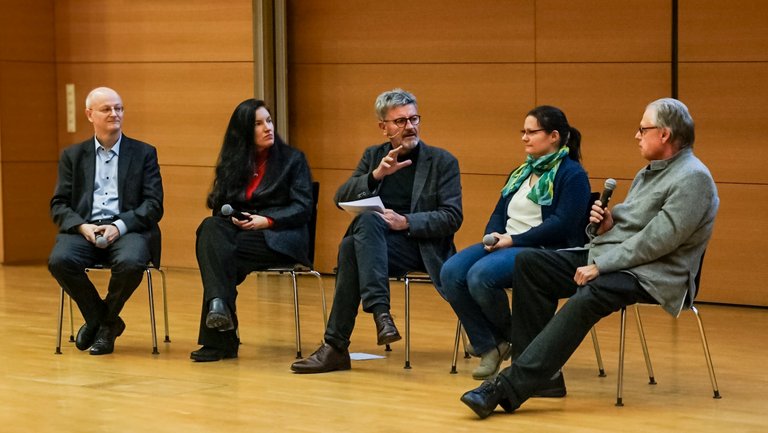Technologies that pave the way for our well-being - in numerous interdisciplinary research projects, scientists at TU Ilmenau are developing innovative technological solutions that improve our quality of life. At the kick-off of the new Scientific Year Environment and Health, researchers spoke about their pioneering work.

Many people want to live as long a healthy life as possible. New technological solutions in medical technology, sensor technology and measurement technology not only increase our quality of life, but also the chances of curing numerous diseases. Scientists around the world are researching promising technologies and methods that preserve our health and environment - including at TU Ilmenau. Through interdisciplinary collaboration, they are conducting cutting-edge research that makes it possible to preserve our native forests, restore hearing to hearing-impaired people, improve mobility thanks to customized prostheses and provide gentle ventilation for surgical patients.
In the Scientific Year Environment and Health, TU Ilmenau is pooling its research activities in this field and presenting a series of innovative research projects that enable people to live healthy, self-determined and long lives. Scientists kicked things off by presenting their research work at the official kick-off of the theme year in the Audimax.
Intelligent hearing aids
The Micro- and Nanoelectronic Systems Group reproduces the principles of biological information processing and storage in electronic systems. Dr. Claudia Lenk is a post-doctoral researcher in the Group and head of the Junior Research Group Bio Sensorics. She wants to develop hearing aids that largely restore the hearing ability of people with hearing impairments. Inspired by biology, scientists in the large-scale joint research project NeuroSensEar are focusing on the human ear and researching intelligent hearing aids. In contrast to conventional hearing aids, they adapt to the wearer and the respective situation, thereby improving speech comprehension. Noise in noisy environments such as a busy restaurant is automatically selected by the device so that wearers can concentrate on the voice of the person they are talking to - just as it works when hearing without a hearing aid.
Dr. Claudia Lenk, Prof. Martin Ziegler and their colleagues are also focusing on the energy efficiency of electronic devices. With a focus on green electronics, they want to bring systems into use that save electricity through intelligent information processing.
Gentle patient ventilation
At the Institute of Biomedical Engineering and Informatics (BMTI), scientists headed by Prof. Jens Haueisen are researching and developing technology-oriented methods and systems for the early detection, diagnosis, treatment and rehabilitation of diseases. In the eVent project, they are researching a new method of artificial respiration. This is a gentler alternative to mechanical ventilation, in which air is forced into the lungs using positive pressure. Possible consequences can include injuries to the lungs, infections and impaired diaphragmatic function. The new method minimizes these risks. Electrodes are used to electrically stimulate the phrenic nerve (diaphragmatic nerve) and contract the respiratory muscles. This electro-ventilation creates a natural breathing movement so that the muscles do not regress even during prolonged ventilation and, for example, the weaning phase after an operation is considerably shortened.
In other research projects, the scientists are testing dry-electrode EEG systems for monitoring brain activity, the use of digital avatars in medicine and care and intelligent clothing that warns wearers of risks in potentially dangerous workplaces.
Biomechatronics for precision surgery
For more than 20 years, the Biomechatronics Group has formed an interface between mechatronics, biology and medicine. Under the leadership of Prof. Hartmut Witte, a mechanical engineer and doctor, the scientists deal with the entire spectrum of medicine - from prevention, diagnostics and therapy to rehabilitation.
In the joint research project Sensorized Surgery, they are working with colleagues in Jena to develop a method for robotic surgery that can be used to determine the boundaries of malignant tumours much more effectively than previously possible when using surgical robots: By virtually displaying the tissue and its surroundings for the robot operators to touch, they can make better decisions about where to cut with the support of AI. Healthy tissue would not be surgically removed, as is often the case during operations for safety reasons, and the high precision of the robots could benefit patients.
Researchers at the department are working on a wide range of applications in the field of environment and health. For example, students have developed an intelligent T-shirt that measures the movements of the back and prevents incorrect posture. The researchers are also active in measuring trees as part of forest monitoring and have developed a cost- and handling-optimized device that can be used to measure and record the growth of the trunk circumference.
Customized AI prostheses
Transferring basic research from the life sciences into applications - this is the aim of the Institute for Bioprocessing and Analytical Measurement Techniques e.V. (iba). The affiliated institute of the TU Ilmenau is headed by Prof. Dr. Doris Heinrich, who is also the head of the Group for Biotechnical Micro- and Nanosystems in Life Sciencesat the TU Ilmenau. In the Bone-Infection-on-a-Chip research project, the researchers are imaging an infection of bone tissue caused by the Covid 19 virus on a chip. This enables the effects of an infection to be analyzed quickly and easily and provides information on possible therapeutic approaches. In the field of 3D biointerfaces, the scientists are also producing customized knee prostheses by evaluating individual patient data using AI.
In the future, the use of quantum effects with a focus on highly efficient sensor technology for the life sciences will also be an important focus of the institute's work.

